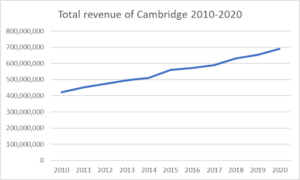What’s going on with the economy in Cambridge?
Dubbed the city of squares, Cambridge, a leading innovation center, is home to some of the world’s most recognized technology companies and educational institutions. With an educated population and a knowledge-based economy, a lot has changed and a lot has remained the same for the city in the last decade.
Government revenue
According to 2010 estimates, Cambridge reported per capita revenue at $4,030 in 2010. In 2020, that figure was $5,839; a 44.8 percent increase in a decade.
Additionally, the city brought in total revenue of $691,306,502 in 2020; far higher than any city in Middlesex County and third highest in the state.


According to the graphs above, total revenue in Cambridge has seen consistent and significant growth in the past decade, experiencing a huge spike of nearly 10 percent between 2014 and 2015 alone.
Excluding local taxes, the majority of this revenue stemmed from three main sources: charges for services, money from the state, and interfund operating transfers, which brought in $65,631,347, $50,688,580, and $42,881,760 respectively in 2020, according to mass analysis.
Overall, revenue growth between 2010 and 2020 was over 63 percent; far higher than the majority of cities in Middlesex County.
Business Climate
Despite certain sectors falling behind in employment growth, the business climate still remains firmly in the hands of higher education and technology, alongside healthcare, government, and research and development.


According to the charts above, the majority of the top 25 companies between the years 2010-2021 were concentrated in professional, scientific, and technical services and educational services. Biotechnology, as expected, had the highest number of the top 25 companies in both 2010 and 2020, adding three additional companies in the last decade. This was followed by research and development, government, healthcare, and higher education; which all saw declines since 2010 by around one or two companies each.
Six other sectors (electronics and health technology, internet technology, marketing software, startup incubator, and travel & education program) each had one company in the top 25 in 2021; the majority of which didn’t make the rank in 2010.
Notwithstanding the employment and wealth these firms have been able to bring to the city, there’s more than meets the eye with Cambridge, especially its cost of living.
Cost of Living

Cambridge is notoriously expensive; with the cost of living being 74 percent higher than the national average. In particular, the cost of housing, utilities, groceries, and transportation is 215, 17, 14, and 18 percent higher than the national average. Furthermore, 12 percent of people are living in poverty.
Despite the cost of living, Cambridge is still home to some of the nation’s highest earning households. According to the U.S. Census Bureau, the annual median household income between 2016-2020 was $107,490, second only to Newton. As a matter of fact, according to the 1950-2010 Decennial Census and 2011-2018 American Community Survey 1-Year-Estimates, Cambridge has seen a 28 percent increase in median household income since 2010 (inflation adjusted), well outpacing income growth statewide. In addition to this, by 2019, overall Cambridge wages were up 55 percent over the past decade; with weekly wage increased by 15.5 percent when adjusted for inflation.
One of the biggest contributions to this job market boom was, according to the Cambridge Community Foundation, “wages from jobs in scientific R&D nearly quadrupled, growing from just over 9 percent of earned wages in 2001 to 32 percent in 2019.”
In short, the cost of living in Cambridge is one of the highest in the state and nation; but it is also home to some of the highest household incomes and has sustained significant wage growth in the past decade.
What does all of this mean?
The vibrant economy of Cambridge is more nuanced than it appears. As employment trend projections change, the business climate continues to favor technology and research and development, and the cost of living and income continues to rise, it’ll be important for residents and companies alike to consider these factors before they decide to call the “city of squares” their home.
Etelson Alcius is a roger perry transparency intern with the Pioneer Institute. He is a recent graduate of Cathedral High School and incoming freshmen at the College of the Holy Cross, where he intends to double major in economics and computer science on a prelaw track. Feel free to reach out via email, linkedin, or write a letter to Pioneer’s Office in Boston.




